

Top 10 Time Management Skills for College Students from a Stanford Entreprenuer. Today, I’ll share some of the time management skills I used and learned as a college and graduate student.
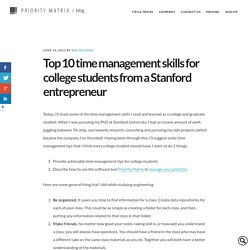
Effects of College Life on Students' Time-Management Skills. College students quickly come to realize that all that college requires of them, including papers, assignments, readings, and lab work—not to mention the family, job, and social responsibilities they must continue to uphold—make it especially important to plan and use their time well.
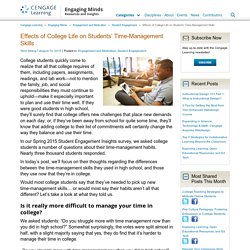
If they were good students in high school, they’ll surely find that college offers new challenges that place new demands on each day; or, if they’ve been away from school for quite some time, they’ll know that adding college to their list of commitments will certainly change the way they balance and use their time. In our Spring 2015 Student Engagement Insights survey, we asked college students a number of questions about their time-management habits.
Nearly three thousand students responded. In today’s post, we’ll focus on their thoughts regarding the differences between the time-management skills they used in high school, and those they use now that they’re in college. 1. 2. Academic Advising Case Studies. Academic Advising Case Studies. Lee - A Case Study in Managing Time. "The Impossible Dream." Lee is an 11th grade student in a good school.

He is smart, popular, and planning on going to a good college. He will likely be accepted to his first choice school. His grades are good. He belongs to some of the school's intramural sports teams. He is active in the drama club and works on the yearbook staff. Time case studies. Time Management Case Study for College Students. Essential Study Skills 5e - Online Case Studies. Tips & Tools to Improve Student Notetaking Skills. I am a scribbler and a note-taker.
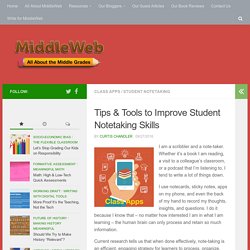
Whether it’s a book I am reading, a visit to a colleague’s classroom, or a podcast that I’m listening to, I tend to write a lot of things down. I use notecards, sticky notes, apps on my phone, and even the back of my hand to record my thoughts, insights, and questions. I do it because I know that – no matter how interested I am in what I am learning – the human brain can only process and retain so much information. Current research tells us that when done effectively, note-taking is an efficient, engaging strategy for learners to process, organize, and transform information (Fryer, 2014; Hattie, 2012). But in the classroom, rarely do our students get excited about taking notes. The good news is that with a few adjustments we can help students transform the painful process of note-taking into a terrific tool for thinking. Note-taking: the first steps. Fixed versus growth intelligence mindsets: It's all in your head, Dweck says.
February 7, 2007 By Lisa Trei When psychology Professor Carol Dweck was a sixth-grader at P.S. 153 in Brooklyn, N.Y., she experienced something that made her want to understand why some people view intelligence as a fixed trait while others embrace it as a quality that can be developed and expanded.
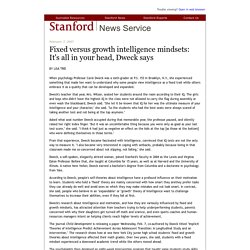
Dweck's teacher that year, Mrs. Online Guides: PQRST Method of Reading. Pqrst. PQRST study method. (I originally found this method in Atkinson, R.
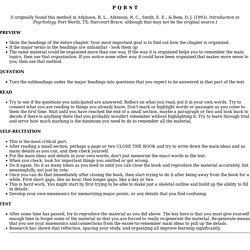
L., Atkinson, R. C., Smith, E. E., & Bem, D. J. (1993). Introduction to Psychology. The PQRST Method of Studying & SQR3 - Five Steps to Master Your Textbook. Quelle: (02-11-30) PREVIEW an assignment by scanning it.
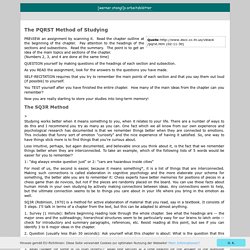
Read the chapter outline at the beginning of the chapter. Age of Distraction: Why It’s Crucial for Students to Learn to Focus. Digital classroom tools like computers, tablets and smartphones offer exciting opportunities to deepen learning through creativity, collaboration and connection, but those very devices can also be distracting to students.
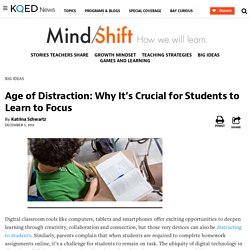
Similarly, parents complain that when students are required to complete homework assignments online, it’s a challenge for students to remain on task. The ubiquity of digital technology in all realms of life isn’t going away, but if students don’t learn how to concentrate and shut out distractions, research shows they’ll have a much harder time succeeding in almost every area. “The real message is because attention is under siege more than it has ever been in human history, we have more distractions than ever before, we have to be more focused on cultivating the skills of attention,” said Daniel Goleman, a psychologist and author of Focus: The Hidden Driver of Excellence and other books about social and emotional learning on KQED’s Forum program.
Taking Notes By Hand May Be Better Than Digitally, Researchers Say. Laptops are common in lecture halls worldwide.
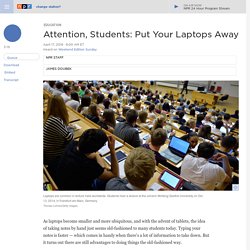
Students hear a lecture at the Johann Wolfang Goethe-University on Oct. 13, 2014, in Frankfurt am Main, Germany. Thomas Lohnes/Getty Images hide caption. College Readiness. Applying the 6 Key Principles of Adult Learning to Yourself. It’s been years since Malcolm Knowles, considered by many to be the “father of adult learning,” articulated a set of six principles – or “assumptions,” as he put it – about how adults tend to learn differently from children.
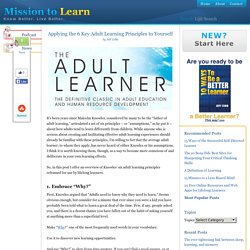
While anyone who is serious about creating and facilitating effective adult learning experiences should already be familiar with these principles, I’m willing to bet that the average adult learner, to whom they apply, has never heard of either Knowles or his assumptions. I think it is worth knowing them, though, as a way to become more conscious of and deliberate in your own learning efforts. So, in this post I offer an overview of Knowles’ six adult learning principles reframed for use by lifelong learners. 1. Embrace “Why?” Self Directed Learning: 15 Ways of the Successful Self-Directed Learner.
The “why” of self-directed learning is survival—your own survival as an individual, and also the survival of the human race. Clearly, we are not talking here about something that would be nice or desirable….We are talking about a basic human competence—the ability to learn on one’s own—that has suddenly become a prerequisite for living in this new world. – Malcom Knowles, 1975 While lifelong learning and self-directed learning are not equivalent, they overlap substantially. I think the following points apply equally to both. Affective Computing: The Learning Companion. Professor Rosalind Picard, Professor Justine Cassell, Dr. Barry Kort, Dr. Rob Reilly, Timothy Bickmore, Ashish Kapoor, Selene Mota and Catherine Vaucelle Overview.
Socratic Method Template - Burnt Umbrage. Cognition, Affect, and Learning - Burnt Umbrage. Role of Emotions In Learning Readers who have some background in math will appreciate where we are going with this model, because we are going to analogize the ups and downs of the 'Learning Curve' (Figure 4) to the properties of a generic mathematical function that exhibits a similar roller-coaster shape. If you study the motion of a real roller-coaster, you find that you need to keep track of four basic parameters -- Time, Distance (or Position), Velocity, and Acceleration. These four parameters are not independent. Example Academic Essay. Social constructivism. Memory Tip #5: Use Visualization Techniques. Visualization techniques are the bedrock of memorable mnemonics, and they are what memory experts use when memorizing long strings of numbers, people’s names, or lists of words in competitions (yes there is such a thing as memory championships). Some people’s imagery is largely nonvisual: visceral or emotional or kinesthetic or something else.
Well, no matter what kind of imagery comes most naturally to you, says Earl Stevick in “Success with foreign languages: seven who achieved it and what worked for them,” it will be well worth your time, when learning a foreign language, to pause and associate the new foreign word or sentence directly with that imagery, rather than with some translation equivalent in your native language. Coming back to the author of “Moonwalking with Einstein“, Foer mentions one of Rome’s greatest orators and prose stylists, Cicero, who agreed that the best way to memorize a speech is point by point, not word by word. This is Memory Tip #5 out of 12. Todd Turton: Reflective practice: These forums are getting pretty good, or at least I think they are giving me a bit more. Future - Hacking our senses to boost learning power.
Learning Is Multi-Sensory: How To Engage All The Senses So Children Really Benefit. Todd Turton: Learning styles. Intrinsic vs. Extrinsic. How and Why Intrinsic Motivation Works. We are more aware than ever that student motivation and engagement is essential for lasting learning. How and Why Intrinsic Motivation Works. Intelligence Isn't Black-and-White. There Are Actually 8 Different Kinds. Transcript. Motivating Yourself to Study. 6 Tips For Finding Motivation To Study. 6 Tips For Finding Motivation To Study. Blog Archive - Cal Newport. Blog Archive - Cal Newport. WEFUSA NewVisionforEducation Report2015. WEFUSA NewVisionforEducation Report2015. The Need to Address Noncognitive Skills in the Education Policy Agenda. Introduction and executive summary Multiple traits compose a broad definition of what it means to be an educated person. Indisputably, being an educated person is associated with having a certain command of a curriculum, and knowledge of theories and facts from various disciplines.
But the term educated also suggests a more far-reaching concept associated with individuals’ full development. How to stop procrastinating. Neuroplasticity: Your Brain’s Amazing Ability to Form New Habits. Science Reveals How Music Can Benefit Your Brain. The Philosophy of Learning and Educational Success.
Fulltext. SOAR versus SQ3R: a test of two study systems. For some international students, 'plagiarism' is a foreign word. Put Working Memory to Work in Learning. How Improv Can Open Up the Mind to Learning in the Classroom and Beyond. Can Students ‘Go Deep’ With Digital Reading? Explore the Brain and Mind - BrainFacts.org. About the Study Hacks Blog - Cal Newport. Study Tools: Free Educational Apps. Start Here! - Fluent in 3 months - Language Hacking and Travel Tips. Scott H Young. Learning in teams. Www.lib.uts.edu.au/sites/default/files/attachments/page/Workbook28May.pdf. Study Skills.
Tips for Online Learning Success - NHCC.edu. How to End the Dropout Crisis: Ten Strategies for Student Retention. 10 Ways to Help Online Learners Succeed. Five-step Strategy for Student Success with Online Learning.